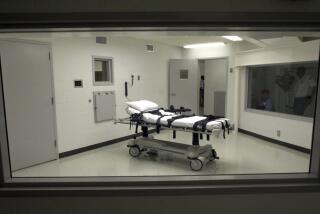Inmate Is Executed After Clinton Denies Clemency Plea
LITTLE ROCK, Ark. — A 25-year-old convicted murderer was put to death by lethal injection Thursday night after Arkansas Gov. Bill Clinton turned down his plea for clemency.
Steven Douglas Hill, sentenced to die for the 1984 slaying of a state police investigator, was given the injection shortly after 9 p.m., local time, in the execution chamber at Cummins state prison in southeast Arkansas. Ten minutes later, state prisons spokesman David White said, Hill was pronounced dead.
The execution occurred on schedule after a day of unsuccessful appeals by Hill’s lawyers. In addition to Clinton’s denial of clemency, the U.S. 8th Circuit Court of Appeals and the U.S. Supreme Court also refused to intercede.
“Things, quite honestly, did go smoothly,” White said. “He was calm and cooperative.”
As was his option, Hill delivered brief final remarks.
“I would like everyone to know that’s rooting for this that they’re going to have to go home and live with it,” he said.
He also asked for the forgiveness of both his own family and that of his victim, Robert W. Klein, the father of two children.
Clinton, the presumptive Democratic presidential nominee, decided late Thursday not to commute Hill’s sentence. As the inmate was placed in a holding cell 20 feet from the chamber where he would later die, the decision was announced in a one-line statement issued through Clinton’s office.
“Gov. Clinton denied clemency after reviewing the court files, including the videotaped confession and transcripts of the clemency hearing and discussions with individuals involved in the case,” said Clinton’s press secretary, Mike Gauldin.
The governor’s last public comment about Hill was delivered Wednesday night, when he arrived in Little Rock after campaigning in West Virginia.
“I still have some videotapes to review,” Clinton said, before driving off without speaking to local television reporters.
The Democratic front-runner, who spent Thursday in the governor’s mansion, has never commuted a death penalty sentence. Hill was the fourth man put to death during his governorship.
He also was the second to be executed in Arkansas this year. On Jan. 24, the state executed Rickey Ray Rector, the brain-damaged murderer of a police officer.
According to Gauldin, the governor receives about 250 requests for clemency each year, for a variety of crimes and penalties. The state Board of Parole and Community Rehabilitation typically recommends granting clemency in about 15 cases each year.
Since 1983, Clinton has granted clemency in eight cases. In each of those cases, the parole board had recommended leniency. Unlike most recent Democratic candidates for President, Clinton personally supports the death penalty, which he says is justified for extreme crimes.
Hill was a teen-ager imprisoned for breaking and entering and criminal mischief when, on Oct. 15, 1984, he and another inmate escaped from a work detail and holed up in a farmhouse south of Little Rock.
Several hours later, Klein was shot in the face as he approached the house. In a videotaped statement to police that was played for the jury at his trial, Hill said he fired the fatal shot.
After Hill’s trial, his fellow escapee, Michael Anthony Cox, contended that he had shot Klein. That formed much of the basis for Hill’s plea for clemency.
But on April 29, despite Hill’s tearful appeal in which he apologized to his victim’s family, the state parole board recommended that clemency be denied.
As execution day approached here, the chorus of calls against the death penalty increased. Four of the state’s religious leaders, in a letter published in the Arkansas Democrat-Gazette, called for Clinton to rescind the sentence.
“We believe the death penalty is increasing the cycle of violence in our society rather than curbing it, as many men and women of goodwill intend it to do,” said the letter, signed by leaders of the Roman Catholic, Episcopal, Jewish and Methodist faiths.
“Can we find no other way to address crimes in which a human life is tragically taken other than taking yet another life?”
More to Read
Sign up for Essential California
The most important California stories and recommendations in your inbox every morning.
You may occasionally receive promotional content from the Los Angeles Times.











